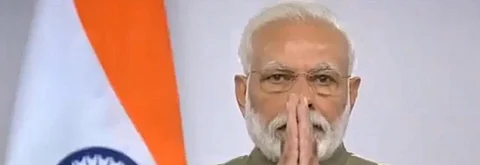

Prime Minister Narendra Modi spoke about more stakes for communities dependent on forests while addressing the Thirteenth Conference of Parties (CoP) of the United Nations Environment Program’s (UNEP) Convention on the Conservation of Migratory Species of Wild Animals’ (CMS).
He, however, skipped any mention of centrally legislated Forest Rights Act, 2006 and incorporating forest-dwelling communities into more democratic forest governance.
“People living at the edges of forests have been incorporated into Joint Forest Management Committees (JFM) and Eco Development Committees (EDC),” Modi said via video-conferencing from New Delhi on February 17, 2020.
The JFM model provides for a committee comprising forest officials as well as forest dwellers for prevention measures such as containing forest fires.
Under JFM, the department is also supposed to share profits from timber harvests. But many studies show that the benefit is either not shared or when shared, it is not what was agreed upon.
EDCs, similar to JFMs, but are meant for villages in Protected Areas and their buffer zones. Their set-up, functioning, role, responsibilities, powers, funds, etc are subject to state-level orders.
Their operation are restricted to protected areas and forest and non-forest areas near protected areas. EDCs are set up to protect wildlife and other biodiversity and for economic development of villages.
“Many studies, including the Forest Research Institute’s own story, says that most JFM committees are defunct. Those functional undertake only what the forest departments want,” said Sharachchandra Lele, distinguished fellow in environmental policy and governance at the Ashoka Trust for Research in Ecology and the Environment’s (ATREE) Centre for Environment & Development.
“Moreover, the timber-harvesting profits are not properly shared and JFM is responsible for creating divisions within forest dweller communities,” he added.
India’s forest dwellers face uncertainty from an ongoing Supreme Court case against FRA, — India’s only law that recognises land traditionally held by forest dwelling and tribal communities.
“Post-FRA, a programme like JFM — without statutory authority —holds no ground. FRA provisions are strong as they provide land-tenurial security and autonomy to people. It has legal backing and people can move court for non-implementation,” Lele said.
Under JFM, people can only execute work allocated by forest departments, he added.
“Whatever carbon-financing has to take place should be through FRA Gram Sabhas (village-level committees). The ministry should stop going back and forth between JFM and FRA,” he said.